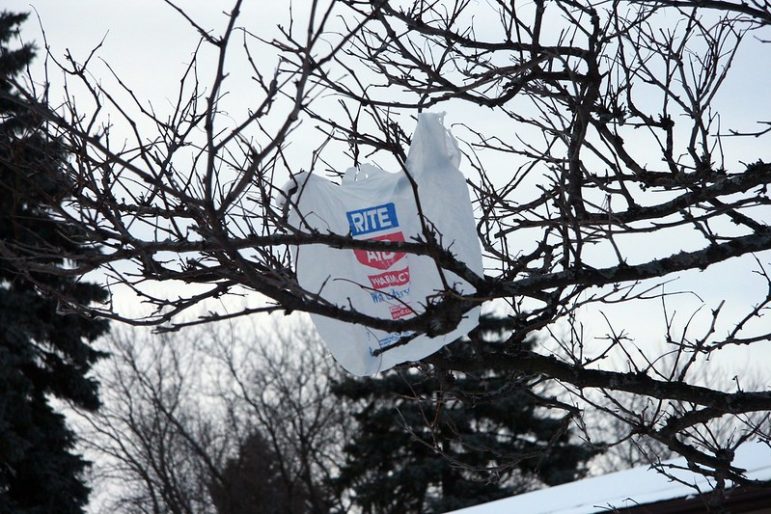
New York will soon implement a statewide ban on most types of plastic grocery bags. As a co-owner of two family-owned Bronx grocery stores, I am doing my best to prepare my business, my employees and my customers for the dramatic change that is coming.
But I am concerned about what I believe will be the widespread negative impacts of this ban, which is so extreme that is both unworkable and unreasonable.
There is an old expression: “Their eyes are bigger than their stomach.” So too is New York’s new law, which goes too far, too fast. The good news is there is an example of a workable ban right here in this state. In January 2018, Suffolk County banned thin plastic grocery bags, but also allowed a variety of low-cost reusable bags made from durable plastic to make sure customers who need a bag would have one.
This approach has worked. According to a March 2019 report, 1.1 billion fewer such bags were used in Suffolk County during the first 12 months of its existence – a reduction of almost 82 percent from the year before.
Paper bags are still an option, but they are very inefficient, and they cost much more than plastic – both for me and my customers. As part of the statewide ban, New York City has opted in to a five-cent fee on paper. This is just another new tax on consumers. Even if I can find enough paper bags for my customers to have the option of paying for them, my bag costs will still soar more than 400 percent.
Industry experts are predicting a run on paper, and a resulting shortage, once New York’s plastic ban takes effect. As a businessman, when I hear “expect shortages,” I understand that to mean “expect higher costs and angry customers.” I also expect checkout times to grow as customers opt to either provide or purchase their bags.
Our stores are in diverse neighborhoods whose residents are largely low-to-moderate income. My stores are less than 12,000 square feet, and neither has a parking lot. Delivery services are limited due to our store size. Most of my customers live within just a few blocks. They walk to our stores carrying their groceries – often several times a week, as many working-class Bronx residents do.
After March 1, if shoppers show up without their own reusable bag and we’re out of paper to offer them, either they will have to purchase a much more costly reusable bag from me, or worse, they will have to hand carry their groceries home.
Keep in mind, none of the money generated by this fee goes to retailers to offset our increased costs for new bags or to administer the ban. If each paper bag costs me an additional ten cents to purchase , I now have the added burden of collecting, holding, and distributing fees quarterly back to the government. Counties that opt in get to keep two cents of the five. The other three cents will go to the state.
 CityViews are readers’ opinions, not those of City Limits. Add your voice today!
CityViews are readers’ opinions, not those of City Limits. Add your voice today!
I am in the business of helping my customers feed their families, not in the selling of bags. I cannot, in good conscience, participate in this burden-shifting exercise. This is one more thing – on top of rising labor costs – that we as business owners have to absorb. Like all retailers, we have had to change how we do business, including raising prices and cutting labor. But, basic economics tells you that you can’t balance an equation by always subtracting.
Nothing communicated by the state to date gives me any hope that my small business – and others like it – will be protected once the plastic bag ban is implemented. In other words, it is small grocers and other retailers who will be left holding the bag.
We care about the environment and have made investments that make us greener but not necessarily more profitable. We are part of the communities we serve and try to be good stewards, but you have to be measured. We have over 160 employees who depend on us to provide a good wage, union benefits, and a healthy environment in which to live and work.
We cannot support this ban, and are asking the state to compromise by allowing more durable reusable plastic bags like Suffolk County does as an alternative. Plastic bags are almost never single use in low to moderate income communities, they are far too valuable to use just once.
A public hearing on these regulations will be held on January 27 in Albany. If state officials and lawmakers truly care about protecting small business owners like me, and the working-class communities we serve, then they should consider our feedback and act with prudence.
Salvatore M. Bonavita is President of Belmonte Markets and Management and co-owner of two family owned supermarkets in the Bronx.









One thought on “Opinion: State Officials Should Adopt Flexible Approach to Looming Bag Ban”
This bag ban needs to be revoked. It’s wrong for the government to force us to use reusable bags. Reusable bags are unsanitary and may contain lead. Using them should be a consumer’s choice. Putting a tax on paper bags will effect those who make a low income. Also what about dog owners what we supposed to clean up after our with. Many owners without a bag won’t clean after their dogs because without plastic bags they won’t be able too.